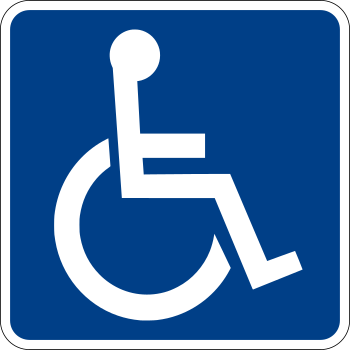| This is the internationally recognized symbol for accessibility (Photo credit: Wikipedia) |
Mobility batteries and VAT
The subject of zero VAT on goods for the disabled and
handicapped has always been a grey area. This article is only related to the UK,
I am not sure what other countries do to offer zero VAT to their disabled
people.
In pre- internet days these types of mobility batteries were
sold through a network of mobility shops, which were normally the place where
the disability scooter or wheel chair were originally bought. This did not prove
to be a problem as far as VAT was concerned ,as the shop staff could see and
would usually know the disabled person personally, and therefore the zero VAT
would have being granted without risk of any type of dishonesty or non-handicapped
people trying to claim the VAT when they are entitled to it.
Now that the internet is here, many battery companies have
sprung up selling mobility scooter batteries online. This has been good for the
consumer because the competition has lowered the price of these special sealed
AGM and Gel batteries that this specialist equipment requires. There are also
specialist batteries that are used on stair lifts and machines that lower
disabled people into the bath. These usually use a 12volt 12amp sealed battery
that needs regular replacement.
The problem with the internet selling of these types of AGM batteries
is the honesty of the public as to whether they are actually disabled or not.
According to the VAT guidelines the definition of disabled is…
The zero-rating of goods and services for disabled people
depends in part upon the status of the recipient - see paragraph 2.1. You can
only zero rate supplies to:
handicapped people
- see paragraph 3.2;
charities - see
paragraph 3.3; and
certain eligible
bodies - see paragraph 3.4.
As a supplier you must take reasonable steps to check that
your customer is eligible to receive your goods or services at the zero rate.
3.2.1 What does ‘chronically sick or disabled’ mean?
A person is ‘chronically sick or disabled’ if he/she is a
person: with a physical or mental impairment which has a long-term and
substantial adverse effect upon his/her ability to carry out everyday
activities; with a condition which the
medical profession treats as a chronic sickness, such as diabetes; or who is terminally ill.
It does not
include a frail elderly person who is otherwise able-bodied or any person who
is only temporarily disabled or incapacitated, such as with a broken limb.
If a parent, spouse or guardian acts on behalf of a
‘chronically sick or disabled’ person, your supply is treated as being made to
that ‘chronically sick or disabled’ person.
The term ‘disabled’ is used throughout this notice and means
‘handicapped’ or ‘disabled or chronically sick’”.
In most case the person wanting to buy a mobility battery
will be registered disabled, but on occasions the husband or wife will want to
organise the battery purchase, under the VAT rules this is perfectly alright to
do. The part of the advice about batteries for the disabled comes under 4.8
Parts and accessories, which is stated as follows…
4.8 Parts and accessories
You can zero rate parts and accessories which you supply to
an eligible customer as defined in paragraph 3.1 provided that they were
designed solely for use in or with goods which themselves qualify for VAT
relief as described elsewhere in this section.
Parts means integral components without which the equipment
is incomplete. Accessories mean optional extras which can be used to improve
the operation of the equipment, or enable it to be used, or to be used to
better affect, in particular circumstances.
Mobility batteries are not standard batteries
VAT relief does not apply to
general use items such as standard
batteries, even if these were purchased to be used within an item which is
eligible for VAT relief. If the batteries
were solely designed to operate within the eligible item however, they would be
eligible for relief.
The batteries that are designed for these types of scooters
are specialist AGM and GEL batteries and in my opinion cannot be classed as
standard batteries. This type of battery is made to be able to dis-charge and
re-charge at very high and low rates. This is to give the wheel chair user the
ability to go further and return on a fully charged battery, before re-charging
is required, a so called standard battery, the type used on a car, is only a
starter battery and cannot be used on a wheel chair. When we at www.BatterieOntheWeb.co.uk
sell a mobility battery online and the customer claims zero VAT we will
download them an exemption form to sign and return or send a form by normal
mail. This is a declaration that they are in fact disabled and are legible to
buy a mobility battery with zero VAT. Newer mobility scooters and wheelchairs will be fitted with another specialist battery the Lithium-Ion battery.
Post written by Eric Roberts


